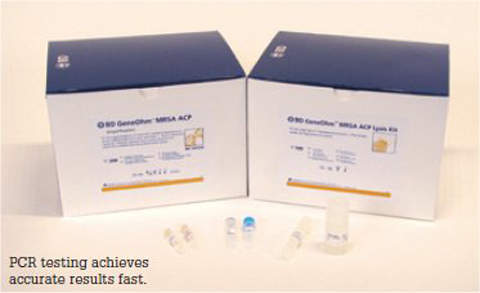Introducing a PCR-based testing system can help reduce healthcare-associated infection rates for all healthcare institutions across Europe facing MRSA challenges, argues BD Diagnostics.
Healthcare-associated infections (HAIs) are linked to significant morbidity, mortality and cost to healthcare systems and as a result command increasing public, professional and governmental attention worldwide.
In the UK, because the mortality rates from hospital superbug MRSA quadrupled between 1997 and 2007, a number of initiatives including the mandatory reporting of these infections were put in place. Recent data published by the Health Protection Agency show that the number of hospital-acquired MRSA infections is beginning to decline. In the financial year 2008/09, there was a 34.1% decrease in the number of reported MRSA bacteraemias received, and in financial year 2007/08, the cases per 10,000 bed days decreased from 1.19 to 0.79.
However, approximately one third of the UK population is colonised with S. aureus, of which 1% to 3% are MRSA. Approximately one quarter of MRSA infections are detected within two days of hospital admission, suggesting that they originated in the community setting; therefore rapid screening of all patients attending hospitals could potentially reduce the number of cases and costs associated with these infections.
Patient screening
Since March 2009, NHS Trust hospitals in the UK are committed to screening all patients admitted for elective surgery. A Department of Health policy document states, “All trusts should have reviewed their screening policies, identified patient groups for screening and implemented a decolonisation regimen for people identified as carrying MRSA, both to reduce their risk of infection occurring in themselves and the spread of MRSA to other vulnerable patients.”
A key component in the rapid identification of MRSA carriage is the introduction of the polymerase chain reaction (PCR)-based MRSA test for all emergency admissions (medical and surgical) and critical care and high-dependency unit admissions (although there is debate about whether all patients, elective and emergency, should be routinely screened). Gradually a body of evidence is beginning to emerge which demonstrates the reduced risk of infection and transmission benefits of rapid screening in testing for MRSA. Rapid screening techniques may have additional benefits, including optimising the use of single rooms, enhancing clinical quality, improving patient safety and reducing the cost of treating MRSA infections. These advantages justify the acquisition costs of new technologies, such as PCR-based MRSA tests.
Rapid confirmation of MRSA carriage permits targeting infection control protocols to minimise risk of infection and cross transmission. PCR is more rapid and accurate than traditional or chromogenic culture testing and the timeliness of reporting can improve the clinical decision-making process. This same timeliness prevents unnecessary isolation in side rooms, barrier nursing and the use of prophylactic decolonisation regimes for emergency admissions. Moreover, patients are reassured by knowing that all emergency admissions are tested and their MRSA status known. The vast majority of patients are reassured of their negative MRSA status while carriers can be optimally managed.
Maintaining high standards
It is important to encourage a consistently high standard of clinical quality and patient care. The key to implementing successful programmes to reduce HAIs is co-operation between chief executives, the infection control team (including microbiologists and laboratory staff) and clinical teams (nursing and medical staff), with every party fully and actively on board. A successful, carefully planned approach to reduce HAI rates, such as the introduction of rapid PCR-based testing, is suitable for all healthcare institutions facing MRSA challenges across Europe.




